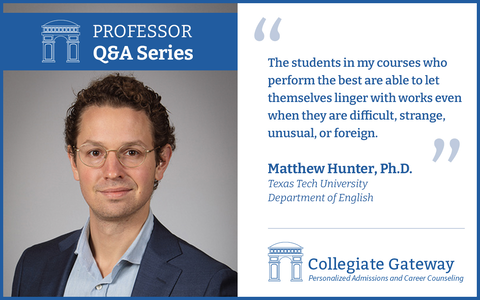 Matthew Hunter is an assistant professor of English at Texas Tech University, where his research and teaching focus on the literature of Shakespeare and his contemporaries. He is currently completing his first book, The Pursuit of Style in Early Modern Drama.
Matthew Hunter is an assistant professor of English at Texas Tech University, where his research and teaching focus on the literature of Shakespeare and his contemporaries. He is currently completing his first book, The Pursuit of Style in Early Modern Drama.
Please describe your work.
I’m an early modernist by trade, which means I specialize in English literature written in the period between 1500 and 1700—the Renaissance, broadly conceived. My particular focus is on the drama written during this time. Shakespeare’s plays are therefore of central and abiding concern for both the courses I teach and the research I conduct, as is the drama of his contemporaries, like Christopher Marlowe, Ben Jonson, Thomas Kyd, John Webster, and many others.
When did you first suspect that you wanted to work in this field? That is, when did you first fall in like—or love?
I loved literature from an early age, but I never read much Shakespeare. My preferences generally skewed towards fiction of the mid-nineteenth to mid-twentieth century. But I was forced to take a Shakespeare course in college (it was a requirement for the English major), and that changed everything. The richness and density of the poetry left me floored, and soon enough I was awkwardly lugging around my Riverside Shakespeare wherever I went. Something there spoke to me, which I wanted to understand more.
Describe the training you’ve undergone, academically and/or professionally, to reach this point in your career.
After graduating from college, I enrolled in a Ph.D. program in the English Department at Yale University. There, I took courses on Renaissance history, Renaissance, literature, literary criticism, and more; I regularly attended seminars at Yale’s rare book library; and I took part in a working group in which graduate students shared and responded to work in progress. During this time, I also taught my first courses, submitted articles for publication, and attended conferences in my field, before completing my dissertation.
What qualities (aptitudes, preferences, personality traits) do you think make students most likely to enjoy and succeed in your classes, and to pursue studies in your field?
I think patience and curiosity are two of the most important qualities to emphasize when it comes to literary studies, and indeed studies in the humanities more broadly. The two go hand in hand. Reading literature is a difficult and time-consuming exercise. It demands a kind of monopoly on our attention that feels out of step with our social media moment. The students in my courses who perform the best are able to let themselves linger with works even when they are difficult, strange, unusual, or foreign. They give themselves the time to ask questions of what they read—and also to notice details about what they read.
If you weren’t a professor, what job would you have?
I ask myself this question often. There are a lot of lawyers in my family, and I could see myself having gone down that path if I hadn’t had as strong an interest in literature.
What’s the best book in your field you’ve read recently? What’s the best book you’ve read recently for pleasure?
The best book that I’ve read for pleasure recently was Rachel Cusk’s Second Place. The best book that I’ve read recently in my field is a harder question to answer, but over the last few weeks, I’ve enjoyed returning to books by older critics—Stephen Booth’s Close Reading without Readings, George T. Wright’s Shakespeare’s Metrical Art, and Frank Kermode’s Shakespeare’s Language—whose attention to poetic detail continues to surprise and delight. I’ve also quite enjoyed Emily Wilson’s study Mocked with Death, which considers tragic over-living—living past one’s end—in classical and early modern tragedies.
Thank you to Matthew Hunter for participating in our Q&A series! Getting to know professors at your school is an important part of the college experience and can help you decide on your best college fit in the college admissions process. Explore the upcoming presentations on our website or set up a complimentary consultation to learn about our services. Whatever your question, Collegiate Gateway is happy to help!
